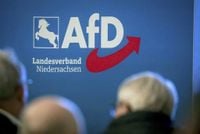In a development that has gripped Germany’s political landscape, six candidates from the right-wing Alternative for Germany (AfD) party have died within a span of just thirteen days ahead of the crucial local elections in North Rhine-Westphalia, scheduled for September 14, 2025. The deaths, which include four main candidates and two reserves, have triggered a wave of speculation, administrative confusion, and renewed debate about the party’s place in German politics. Authorities, meanwhile, maintain that there is no evidence of foul play.
The deceased candidates—Ralph Lange, 66; Wolfgang Klinger, 71; Stefan Berendes, 59; Wolfgang Seitz, 59; and reserves René Herford and Patrick Tietze—were all set to appear on ballots in North Rhine-Westphalia, Germany’s most populous state with 18 million residents. With a reported 20,000 candidates running for office this cycle, the deaths stand out both for their timing and their impact on election logistics. According to the BBC, two of the deaths have been officially attributed to natural causes, while the causes of the remaining cases have not been publicly disclosed, partly out of respect for the families’ privacy.
Local authorities and election administrators have been forced into action. The sudden vacancies required ballots to be reprinted multiple times, and in some municipalities, postal voters were instructed to cast their ballots anew. The City of Blomberg, in a press release following Lange’s death, stated, “All affected voters will automatically receive the new postal ballots as soon as they are available. The city of Blomberg asks for your understanding of this extraordinary situation and is available to answer any questions at any time.” Similar statements were issued by other affected cities, with the City of Schwerte noting, “This means that all postal votes cast so far have had to be declared invalid. So far, around 200 people from the Schwerte-Mitte V district have already voted. They will all now receive new postal voting documents by mail, including those who voted directly at City Hall.”
Despite the administrative upheaval, police and the state’s Interior Ministry have repeatedly emphasized that there is no evidence of criminal activity. According to Newsweek, most of the deaths involved pre-existing health conditions and natural causes. A spokesperson for the AfD in North Rhine-Westphalia told Politico, as translated by the German daily Die Welt, that ongoing investigations had not revealed any signs of foul play. The Interior Ministry also clarified that deaths among candidates were not limited to the AfD; candidates from the Greens and Social Democrats had also died during the same period.
Nevertheless, the cluster of deaths has fueled rampant speculation, particularly online. Theories about possible connections or sinister motives have proliferated across social media, sometimes fanned by party leadership itself. Alice Weidel, the AfD’s co-leader, reposted a comment by retired economist Stefan Homburg, who claimed that the number of deaths was “statistically almost impossible.” Weidel’s amplification of the claim did little to calm the waters. The BBC reports that her repost read simply, “Four AfD candidates have died.”
Within the AfD, there is some division over how to address the speculation. Kay Gottschalk, the party’s deputy leader in North Rhine-Westphalia, struck a more cautious tone in an interview with Politico’s Berlin Playbook Podcast, saying, “What I have in front of me—but that’s just partial information—that doesn’t back up these suspicions at the moment.” He added that the party wanted investigations to proceed “without immediately getting into conspiracy-theory territory.”
The deaths come at a pivotal moment for the AfD, a party that has seen its fortunes rise dramatically in recent years. Once considered a fringe movement, the AfD became Germany’s second-largest party in the February 2025 federal elections, expanding its influence from its traditional eastern strongholds into western regions like North Rhine-Westphalia. In the 2022 state elections, the AfD managed just 5.4% of the vote in North Rhine-Westphalia, but recent polls put its support at 16.8%, according to the BBC.
That surge in support has not come without controversy. Germany’s domestic intelligence agency classified the AfD as a “right-wing extremist organization” in May 2025, though the designation was suspended following a court appeal that remains unresolved. In three eastern states, the party’s regional affiliates continue to be listed as extremist. The classification has been a point of contention, with AfD leaders insisting that the party is being unfairly targeted by the political establishment and security services.
The party’s rise has attracted international attention—and endorsements. Tech billionaire Elon Musk, who earlier this year voiced support for the AfD’s migration policies, recently reiterated his backing, even appearing via video link at an AfD campaign event in Halle. Musk told the assembled crowd, “It’s good to be proud of German culture, German values, and not to lose that in some sort of multiculturalism that dilutes everything. There is too much focus on past guilt, and we need to move beyond that. I’m very excited for the AfD, I think you’re really the best hope for Germany’s fight for a great future for Germany.” Weidel, in turn, thanked Musk and called on supporters to “make Germany great again.”
For election officials and voters alike, the immediate concern remains the integrity and smooth functioning of the electoral process. The need to reprint ballots and reissue postal voting documents has caused headaches for local administrations, but authorities insist that all necessary steps are being taken to ensure every vote counts. The City of Rheinberg, where candidate Wolfgang Seitz’s death was announced, advised citizens, “If affected voters still have their postal voting documents at home, please ensure they use only the new ones, as otherwise their vote may be invalidated.”
As the September 14 election approaches, the AfD’s prospects in North Rhine-Westphalia are being closely watched as a barometer of the party’s national momentum. The deaths of six candidates, while tragic and disruptive, have also become a flashpoint for broader debates about political polarization, the role of social media in shaping public perception, and the challenges of running a fair and transparent election in the digital age.
For now, the official line from German authorities is clear: there is no evidence of foul play, and the deaths are being treated as tragic coincidences. But with emotions running high and speculation continuing online, the story is far from over. The outcome of the North Rhine-Westphalia elections—and the AfD’s performance therein—may well determine how this extraordinary episode is remembered in Germany’s political history.


